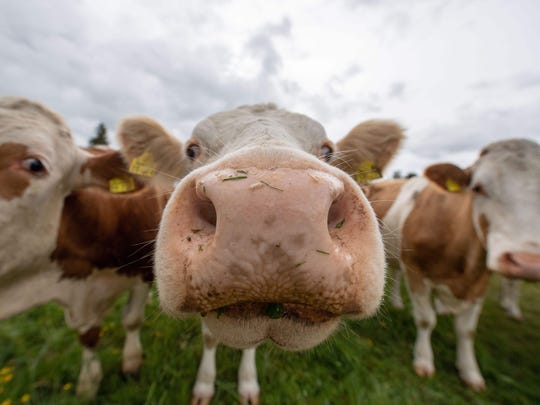Even vegetarians can rejoice over these new types of meat hitting the market. Here's why.
Just the FAQs, USA TODAY
Go ahead, grill a burger. Going vegetarian can help our climate a little bit, but it's an inefficient policy to try to push on people worldwide.
Clarifications
& corrections: This column has been updated to clarify that the
summer barbecue study was conducted by the University of Manchester in
the United Kingdom.
Around the
world, we’re being told to stop eating meat. Headlines, think tanks and
activists all ask us to change our diet to combat climate change.
The Washington D.C.-based World Resource Institute suggests that resource management will require Americans to cut their average consumption of beef by about 40%,
and scientists from the University of Manchester in the United
Kingdom just claimed that “a typical summer barbecue for four people releases more greenhouse gases
into the atmosphere than an 80 mile car journey." One of the professors
points out that “the production of a 100g medium-sized beef burger
releases enough greenhouses gases to fill more than 60 balloons.”
The
scientists propose a solution: we all need to replace our burgers with
“veggie sausages,” swap the cheese for half an onion and replace the
butter with “vegetable spread”. Voila: half the emissions.
I’m
a vegetarian myself for ethical reasons, but the climate scientists’
barbecue prescription leaves me with a bad taste in my mouth — and it is
not just the vegetable spread.
Social pressure to hold the steak
After
years of failed global attempts to cut carbon emissions meaningfully,
some activists are propagating the idea that everyone on the planet
should go vegetarian or even vegan.
It’s
interesting to note that even environmentalists themselves are loathe
to make the major lifestyle changes that would be required to avoid all
meat products. A recent survey found that most of the UK Green Party’s
elected representatives are in fact meat-eaters,
with considerable disagreement on how important vegetarianism is in
combating climate change, ranging from those who believe that it’s the
biggest personal contribution anyone can make, to more sensible
politicians who see veganism is a fad.
The
idea of forcing carnivores to eat outside in the rain might be an
interesting conversation starter in Bonn, Germany, where the United
Nations Framework Convention on Climate Change is based, but it blithely ignores the reality that elsewhere on the planet, 1.45 billion people are vegetarians today not because they prefer veggie burgers, but because of poverty. Those people desperately want to be able to afford meat.
There’s
an even more fundamental problem with the idea that we replace steak
dinners with tomato steaks. The truth is we can’t stop temperature rises
with our diets.
Vegetarians lose on practicality
We’re often told that going vegetarian is the biggest thing that any of us could do, with headlines telling us: "Cut your carbon footprint in half by going vegetarian." Statements like that are misleading for two reasons.
First, that cut isn’t to our entire emissions — just those from food. That means Four-fifths of emissions are ignored, according to an analysis of emission from the European Union, which means the impact is actually five-times lower.
Second, the more optimistic figures
about how much of your emissions you can cut are based not just on a
vegetarian diet, but on an entirely vegan one where we avoid every
single animal product altogether.
A systematic peer-review of studies of going vegetarian shows that a non-meat diet will likely reduce an individual’s emissions by the equivalent of nearly 1,200 lbs carbon dioxide. For the average person in the industrialized world, that means an emissions cut of just 4.3%.
This still overstates the effect, because it ignores the well-established "rebound effect." Vegetarian
diets are slightly cheaper, and saved money will likely be spent on
other goods and services that cause extra greenhouse gas emissions. In
the U.S., vegetarians save at least $750 on their food budgets
every year. That extra spending will cause more carbon
dioxide emissions, cancelling about half the saved carbon emissions from
going vegetarian.
In
a first world setting, the reality is that going entirely vegetarian
for the rest of your life means you reduce your emissions by about 2%, according to a study of the environmental impact of Swedish vegetarians.
To put this into context: either you could go vegetarian for the rest of your life, or you could reduce your emissions by the exact same amount by spending a little more than $3 a year using the Regional Greenhouse Gas Initiative, the first mandatory market-based program in the United States covering several states to reduce greenhouse gas emissions.
Given
all of this, it seems downright mean-spirited of the University of
Manchester scientists to try to shame people for having a summer
barbecue.
It would be a better use of their time to
push for more spending on development of artificial meat, which is
showing much greater promise than the idea that all the planet’s
meat-eaters will develop a taste for vegan alternatives. They should
also push for global research and development into green energy.
This
technology needs to be massively developed so that we can bring forward
the day when alternatives can out-compete fossil fuels, and we can rein
in temperature rises while still growing our economies.
Going
vegetarian can help a little bit, but it's both an unrealistic and
inefficient policy to push on people across the world. We should focus
on research to develop cleaner, maybe artificial, meat and cheaper clean
energy. And while we do so, we can have our summer barbecues without
being told they destroy the planet.

No comments:
Post a Comment